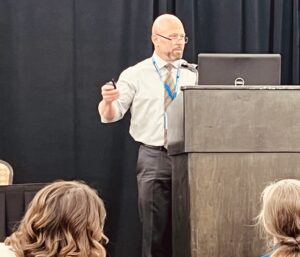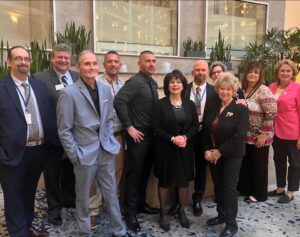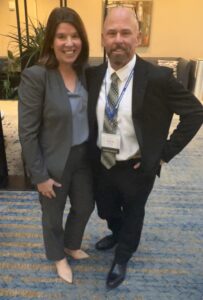 In an era where innovation is celebrated as a key to overcoming complex social issues, the Ohio Recovery Housing Innovation Challenge Symposium, held on March 19th at the Embassy Suites in Dublin, Ohio, shone brightly as a testament to transformative goals. The challenge attracted a wide array of submissions from across the state, and Hope Town Ohio was honored to be selected as a finalist. Among the select few projects that made it to the final round, our initiative, Hope on Wheels, stood out as a pioneering program, casting a light on the potential for real change.
In an era where innovation is celebrated as a key to overcoming complex social issues, the Ohio Recovery Housing Innovation Challenge Symposium, held on March 19th at the Embassy Suites in Dublin, Ohio, shone brightly as a testament to transformative goals. The challenge attracted a wide array of submissions from across the state, and Hope Town Ohio was honored to be selected as a finalist. Among the select few projects that made it to the final round, our initiative, Hope on Wheels, stood out as a pioneering program, casting a light on the potential for real change.
While Hope Town Ohio may not have taken home the grand prize, our journey to the spotlight of this prestigious event is a story of inspiration and determination for our staff and recovery community members. Celebrating a decade of dedication to recovery housing innovation, the symposium attracted some of the most visionary organizations in addiction recovery.
Ted St. John, Chief Executive of Hope Town Ohio, led the charge with an initiative that’s more than just a service—it’s a lifeline. As Ted put it, Hope on Wheels isn’t merely a transportation solution; it’s a bridge to a better life for those grappling with substance use disorders.
Hope on Wheels program has been instrumental in addressing the transportation challenges faced by Ohio residents, particularly in accessing critical medical appointments. The ongoing workforce crisis has exacerbated transportation difficulties, leading to delays and even stranded individuals. Hope on Wheels aims to alleviate this burden by providing reliable Medicaid rides and ensuring the community’s access to essential healthcare services.
A Vision of Hope on Wheels
Ted’s presentation opened with a striking image: a person in early recovery, vulnerable, and in dire need of support. This visual served as a poignant reminder of the harsh realities faced by many—being cut off from essential SUD treatment services, job opportunities, and a shot at a new life due to the lack of transportation. In this moment of desperation, Ted’s message was clear: the path to sobriety and recovery is fraught with challenges, but it’s a journey that Hope Town Ohio is committed to making accessible to all.
Ted shared, “I have been in this situation before, and to have someone tell me just to hang in there and do the next right thing when I’m barely sober and trying my best to get to a support group is a tough sell. How can we make transportation more accessible so it’s easier on people trying to rebuild their lives?”
Since launching this program in June 2022, Hope on Wheels has provided over 13,000 rides and driven over 563,495 miles. Notably, 36% of these rides were recovery-related, emphasizing the program’s dedication to supporting individuals in their journey toward recovery.

Ted’s Journey: From Struggle to Empowerment
Introducing Ted St. John requires a glimpse into his own life story—27 years in active addiction followed by 15 years in active recovery. Ted’s journey from a childhood marred by trauma and poverty to becoming a beacon of hope for others is a testament to resilience and the transformative power of recovery. His experience underscores the importance of addressing not just the symptoms of addiction but its root causes, including trauma and socioeconomic barriers.
Ted shared, “I came up as an undersized kid in poverty, living with childhood trauma and abandonment. I can tell you the moment that broke me when I was young, and I spent the next 30-plus years trying to hide it. I was the guy who didn’t want to be looked at as a victim and kept overcompensating and using drugs as my escape. Fortunately, I’m a prove-them-wrong-break-the-cycle guy, and that’s how I’m standing before you today.”
The Impact of Innovation
 The symposium wasn’t just a platform for showcasing projects; it celebrated a decade’s progress in recovery housing. Judges, renowned for their expertise and dedication to innovation, were tasked with selecting a winner from an impressive lineup of finalists. The accolade ultimately went to another deserving project, House of Hope, a financial literacy education and coaching program. Still, the spirit of victory was shared among all participants, who spearhead significant advances in tackling the complexities of recovery.
The symposium wasn’t just a platform for showcasing projects; it celebrated a decade’s progress in recovery housing. Judges, renowned for their expertise and dedication to innovation, were tasked with selecting a winner from an impressive lineup of finalists. The accolade ultimately went to another deserving project, House of Hope, a financial literacy education and coaching program. Still, the spirit of victory was shared among all participants, who spearhead significant advances in tackling the complexities of recovery.
Forward with Hope
As Hope Town, Ohio, moves forward, our transportation program symbolizes its commitment to making a tangible difference in the lives of those on the path to recovery. Ted’s passion is evident: “I’m passionate about transportation and this innovation. I know improving transportation for people in recovery impacts lives and outcomes and changes families’ legacies forever. We can do better; we must do better.”
Echoing this sentiment, Dr. Corrie L. Vilsaint, Ph.D., Associate Director of Recovery Health Equity at the National Recovery Research Institute at Massachusetts General Hospital and an instructor at Harvard Medical School, highlighted the critical need to prioritize interventions beyond symptom reduction. “The biggest cost of substance use disorders is lost productivity. We must link individuals to meaningful employment and training opportunities if we’re going to make a dent in this epidemic. ‘Hope on Wheels’ hits the nail on the head by focusing on strategic interventions that truly make a difference. Your genius was the ability to identify an engine of recovery housing that was relevant and sustainable given your talents and needs, as well as those of your clients, and the community around you, which resulted in your innovation. We need people to replicate that all across the country.“
